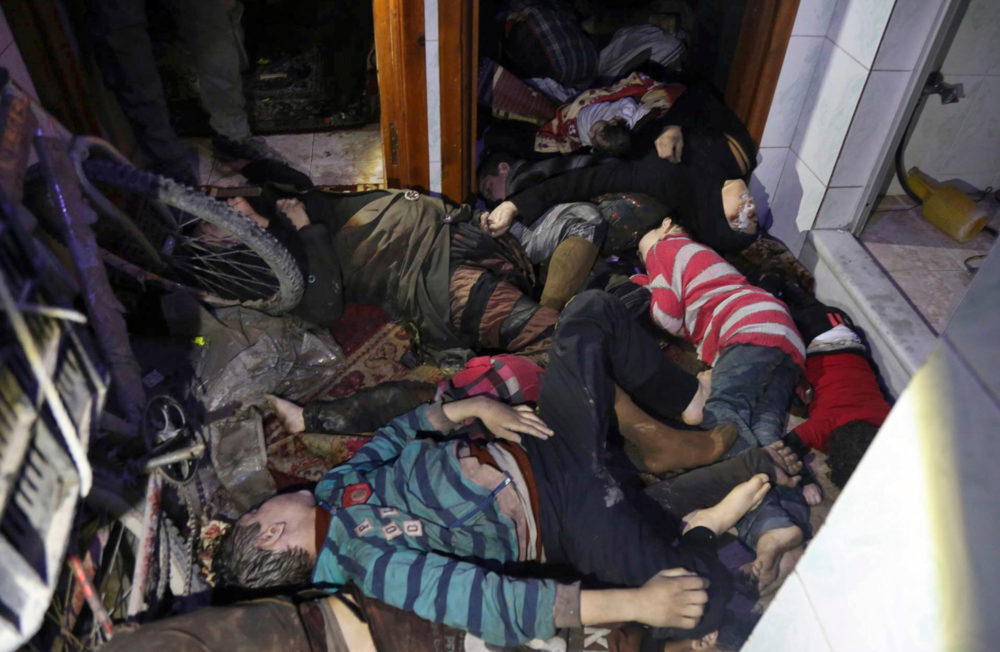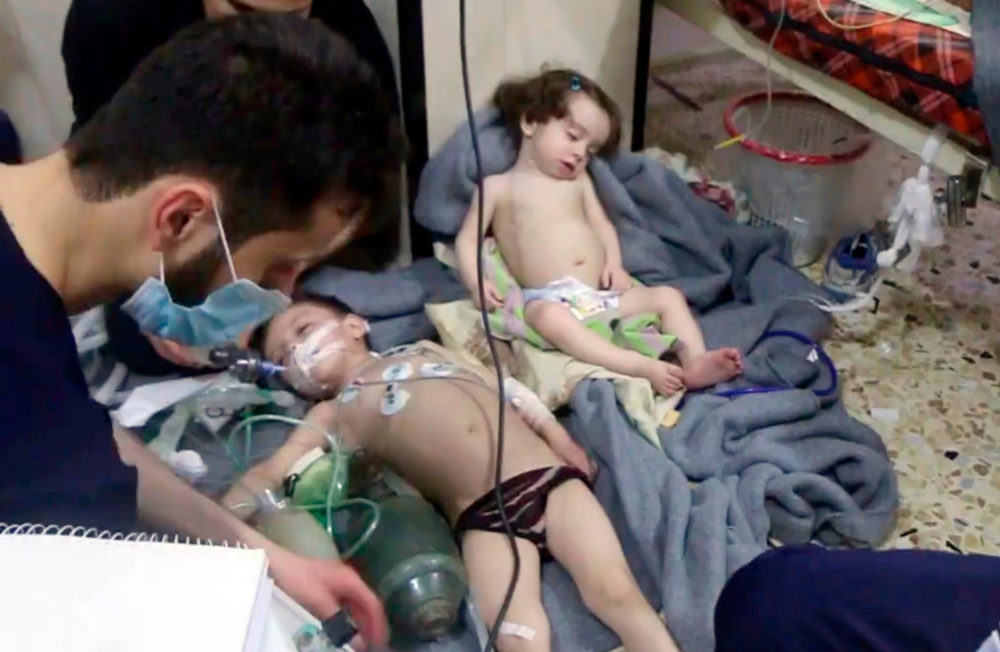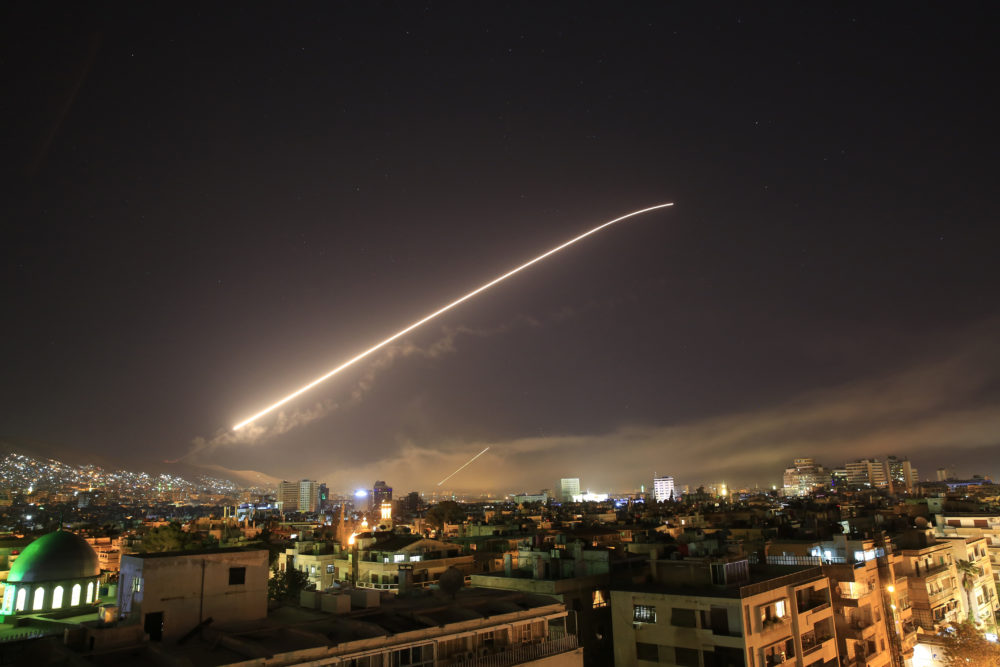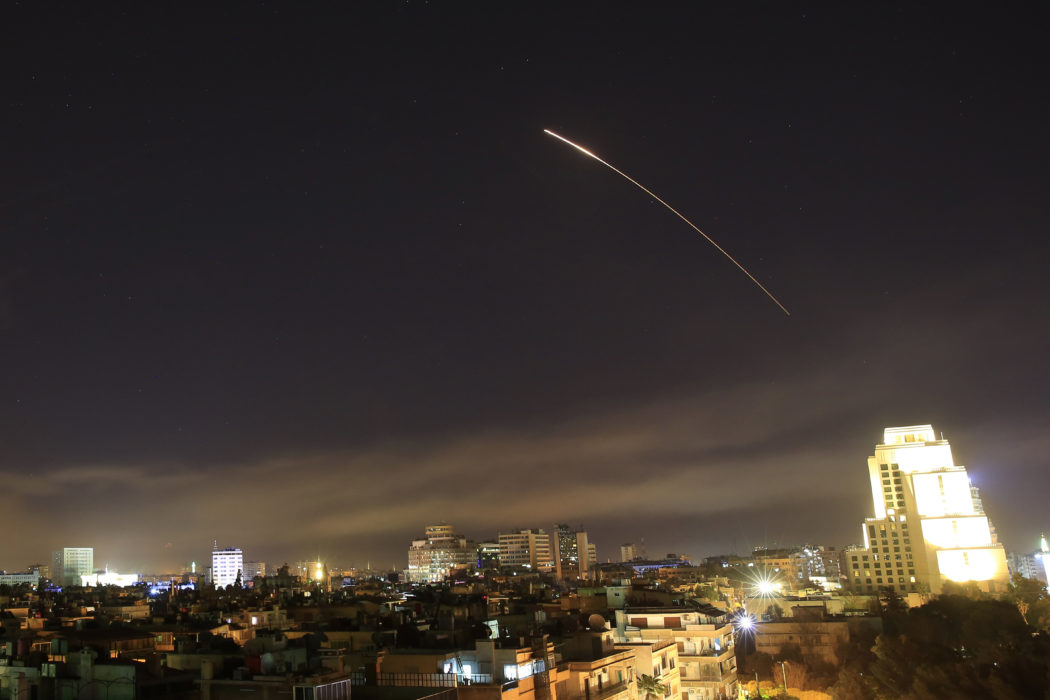AP STORY: Explosions rock Syrian capital as Trump announces strikes
By BASSEM MROUE, Associated Press
DAMASCUS, Syria (AP) — Loud explosions rocked Syria’s capital and filled the sky with heavy smoke early Saturday after U.S. President Donald Trump announced airstrikes in retaliation for the country’s alleged use of chemical weapons. Syrian air defenses responded to the joint strikes by the United States, France and Britain.
Associated Press reporters saw smoke rising from east Damascus and the lit-up sky turning orange for the blasts. A huge fire could be seen from a distance to the east. Syrian television said the attacks targeted a scientific research center in Barzeh, near Damascus, and an army depot near Homs.
Syrian media reported that air defenses had hit 13 incoming rockets south of Damascus.
After the attack ceased and the early morning skies went dark once more, vehicles with loudspeakers roamed the streets of Damascus blaring nationalist songs.
“Good souls will not be humiliated,” Syria’s presidency tweeted after airstrikes began.
Syrian state TV called the attacks a “blatant violation of international law and shows contempt for international legitimacy.”
Trump announced Friday night that the three allies had launched military strikes to punish Syrian President Bashar Assad for the alleged chemical weapons use and to prevent him from doing it again.
 Syrian Civil Defense White Helmets via AP, File
Syrian Civil Defense White Helmets via AP, File FILE – EDS NOTE: GRAPHIC CONTENT – This Sunday, April. 8, 2018 file image released by the Syrian Civil Defense White Helmets, shows victims of an alleged chemical weapons attack collapsed on the floor of a building in the rebel-held town of Douma, near Damascus, Syria. Chemical weapons have killed hundreds of people since the start of Syria’s conflict, with the U.N. blaming four attacks on the Syrian government and a fourth on the Islamic State group. A suspected chemical weapons attack occurred over the weekend in the besieged rebel-held town of Douma that was subjected to a resumed government offensive for three days starting Saturday. (Syrian Civil Defense White Helmets via AP, File)
The U.S. president said Washington is prepared to “sustain” pressure on Assad until he ends what the president called a criminal pattern of killing his own people with internationally banned chemical weapons. It was not immediately clear whether Trump meant the military operation would extend beyond an initial nighttime round of missile strikes.
The Syrian government has repeatedly denied any use of banned weapons.
 Syrian Civil Defense White Helmets via AP, File
Syrian Civil Defense White Helmets via AP, File FILE – This Sunday, April 8, 2018 file image made from video released by the Syrian Civil Defense White Helmets, shows medical workers treating toddlers following an alleged poison gas attack in the opposition-held town of Douma, near Damascus, Syria. With the Middle East on edge and many fearing inadvertent triggering of regional war, it is easy to forget that two weeks ago Trump shocked advisers in declaring an intention to withdraw troops from Syria. Now, apparently angered by a suspected chemical attack, Trump is threatening imminent military strikes against the Syrian government forces he blames and rattling a saber at Syria’s patron Russia. (Syrian Civil Defense White Helmets via AP, File)
U.S. Defense Secretary James Mattis said there were no reports of U.S. losses during the initial airstrikes.
“Right now this is a one-time shot,” he said but did not rule out further attacks. He said the airstrikes were launched against several sites that helped provide Assad’s ability to create chemical weapons.
Britain’s defense ministry said that while the effectiveness of the strike is still being analyzed, “initial indications are that the precision of the Storm Shadow weapons and meticulous target planning have resulted in a successful attack.”
British Prime Minister Theresa May describes the attack as neither “about intervening in a civil war” nor “about regime change” but a limited and targeted strike that “does not further escalate tensions in the region” and does everything possible to prevent civilian casualties.
“We would have preferred an alternative path. But on this occasion there is none,” May said.
The decision to strike, after days of deliberations, marked Trump’s second order to attack Syria; he authorized a barrage of Tomahawk cruise missiles to hit a single Syrian airfield in April 2017 in retaliation for Assad’s use of sarin gas against civilians.
 AP Photo/Hassan Ammar
AP Photo/Hassan Ammar The Damascus sky lights up missile fire as the U.S. launches an attack on Syria targeting different parts of the capital early Saturday, April 14, 2018. Syria’s capital has been rocked by loud explosions that lit up the sky with heavy smoke as U.S. President Donald Trump announced airstrikes in retaliation for the country’s alleged use of chemical weapons. (AP Photo/Hassan Ammar)
Trump chastised Syria’s two main allies, Russia and Iran, for their roles in supporting “murderous dictators,” and noted that Russian President Vladimir Putin had guaranteed a 2013 international agreement for Assad to get rid of all of his chemical weapons. He called on Moscow to change course and join the West in seeking a more responsible regime in Damascus.
Russia’s U.S. embassy released a statement warning that the airstrikes will “not be left without consequences.” It said that “all responsibility” rests with Washington, London and Paris.
The allied operation comes a year after the U.S. missile strike that Trump said was meant to deter Assad from further use of chemical weapons. Since that did not work, a more intense attack would aim to degrade his ability to carry out further such attacks, and would try to do this by hitting Syrian aircraft, military depots and chemical facilities, among other things.
The one-off missile strike in April 2017 targeted the airfield from which the Syrian aircraft had launched their gas attack. But the damage was limited, and a defiant Assad returned to episodic use of chlorine and perhaps other chemicals.
Friday’s strikes appear to signal Trump’s willingness to draw the United States more deeply into the Syrian conflict. The participation of British and French forces enables Trump to assert a wider international commitment against the use of chemical weapons, but the multi-pronged attack carries the risk of Russian retaliation.
In his nationwide address, Trump stressed that he has no interest in a longtime fight with Syria.
“America does not seek an indefinite presence in Syria under no circumstances,” he said. “As other nations step up their contributions, we look forward to the day when we can bring our warriors home.”
The U.S. has about 2,000 troops on the ground in Syria as advisers to a makeshift group of anti-Islamic State fighters known as the Syrian Democratic Forces. They are in eastern Syria, far from Damascus. A U.S.-led coalition has been conducting airstrikes in Syria since September 2014 as part of a largely successful effort to break the IS grip on both Syria and Iraq.

